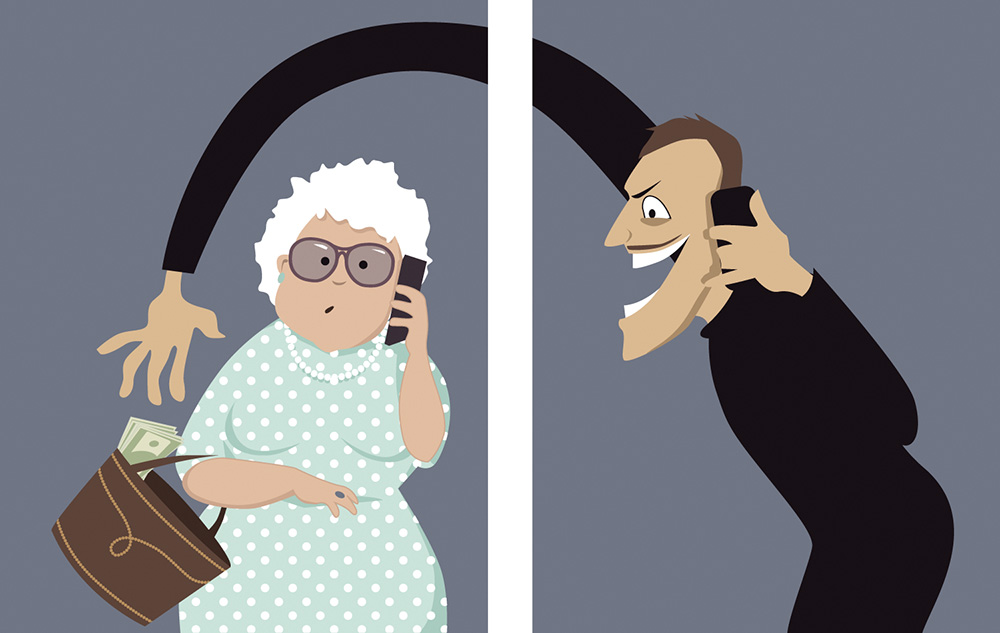By Richard Bauman
I answered the phone one morning and heard someone who sounded like our grandson, Edward, say, “Hi grandpa, it’s your favorite grandson.” And that’s how the “grandparent scam” usually starts.
That jovial greeting is usually followed by a tale of woe. In this instance, Edward was supposedly in New York for a buddy’s bachelor party. He had wrecked a rental car and been arrested for DUI.
Then comes the plea for money. He needed $8,000 to pay his fine and to fix the car. “Please help me out, grandpa,” that’s followed by another plea: “Please don’t tell my parents. I’ll explain it to them when I get home.”
My response to the fake Edward: “You’re a fraud,” and I hung up on him.
I knew that Ed wasn’t at a bachelor party in New York. He lives in California, and is a 14-year old high school freshman.
What should you do if you get a phone call supposedly from one of your grandchildren claiming to be in another state, or even a foreign country, and desperately needs several thousand dollars to get out of a jam?
First, be careful. Our natural inclination is to jump in and help but that could be the worst thing to do. Instead of reacting quickly:
⊃ Take a deep breath or two, relax and be noncommittal
⊃ Ask for a phone number where you can later reach him/her
⊃ Contact the supposed grandchild’s parents, siblings and others who would know if he or she is away from home as claimed.
⊃ If you know your grandchild’s cell phone, call him/her and leave a voicemail if need be, or text asking him/her to call you.
⊃ Be wary if the caller doesn’t sound like your grandchild; ask about it. Scammers usually will say it’s a bad connection or he/she has a cold or make some other vague explanation for their odd sounding voice.
Typically, grandparents are asked to wire the money to some out of state or out of the country location. Sometimes grandparents are told to buy several thousand dollars in prepaid debit cards and then phone the “grandchild” with the scratch-off numbers on the back of the cards. They can then use those numbers to get the money.
According to the National Council on Aging, the grandparent scam is successful because it is so simple, and devious, and it uses one of older adults’ most reliable assets – their hearts.
Older people are often easy targets for such cons, according to the AARP, because:
⊃ They’re more likely to be home during the day
⊃ They expect people to be honest
⊃ They are less likely to act when defrauded.
Further, the National Council on Aging estimated that senior citizens are robbed of about $3 billion annually via various financial scams.
Scamming grandparents can be lucrative for well-practiced criminals. Especially since the odds of being caught and prosecuted are slim.
One incarcerated scammer told journalist Carter Evans: “You can make $10,000 … in a day if you do it properly. Once you get them emotionally involved, then they’ll do anything for you, basically.”
“The effect (of the scam) on the victims is so great. It’s not simply the loss of the money. They feel stupid, they feel gullible, and they have nightmares about it and anxiety and depression,” says former Assistant U.S. Attorney Ellyn Lindsey, who successfully prosecuted the scammer that Carter Evans interviewed.
There are also email versions of this swindle. You receive an email supposedly from a friend who is in a foreign country, and has been robbed and needs money to pay for a new passport, his/her hotel and airfare home. I received such an email from my friend Connie, who said she was stuck in London. I knew it was a scam since Connie had died six months before the email arrived.
Recently, my wife received an email plea for help from a nun she knows who was ostensibly stranded in the Philippines. She called the nun’s cell phone and learned she was not stranded in the Philippines or anywhere else. She told Donna she had received numerous calls from people concerned about her well-being.
If a supposed grandchild, relative or friend either calls or emails and claims to be in dire need of money, after having had some devastating experience in either another state or a foreign country, fight the urge to react quickly to the request. Take the time to verify his or her story. It might truly be someone in need of help, but the call or email is more likely just an attempt to separate you from your money.
Lastly, when you receive a call from a number you don’t recognize, let your voicemail answer the call. Scammers don’t usually leave messages.





